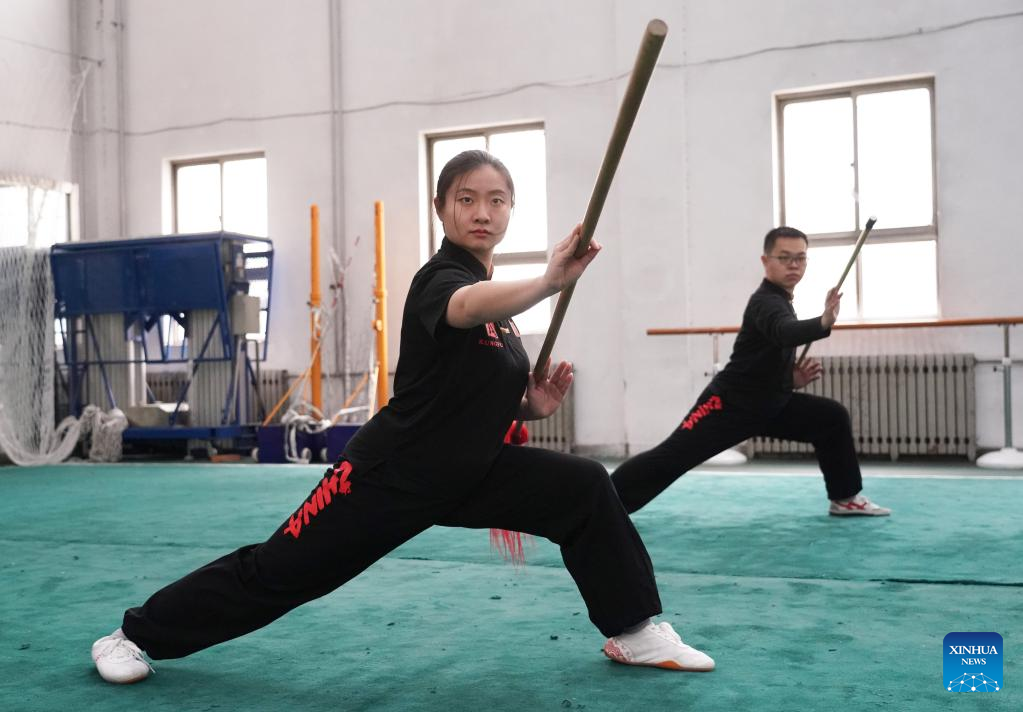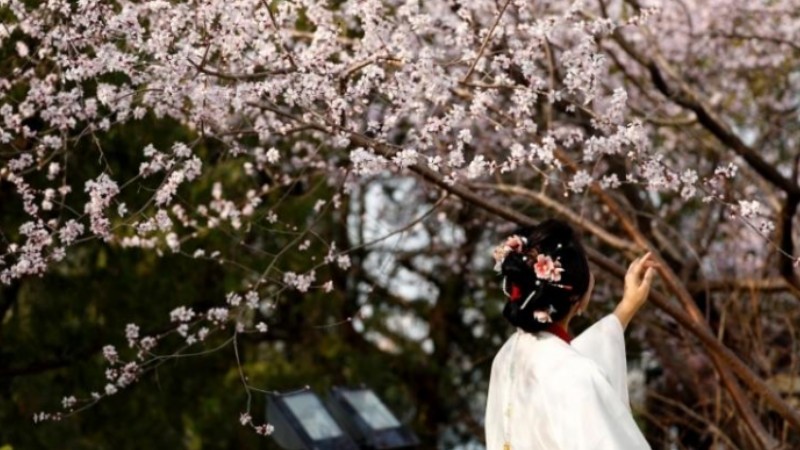China Focus: Martial arts growing in popularity among young Chinese

Li Jinqi (front) practices Daoshu, broadsword play, with members of the martial arts club at Beihang University in Beijing, capital of China, March 11, 2023. (Xinhua/Ren Chao)
BEIJING, March 11 (Xinhua) -- Lifting a spear, Li Jinqi pulled it across her shoulders and spun it quickly. Following her example were 10 peers in two rows who wore the same Kungfu-style garments and produced the same movements.
Li is a 24-year-old Ph.D. student at Beihang University in Beijing, but she is more widely known on campus as a martial arts master.
Though very busy with research and coursework, the Ph.D. student said practicing martial arts has become a daily routine for her over the past five years.
She has studied various styles including boxing, swordplay, and cudgel play, and won several cross-campus martial arts competitions held in the capital city.
She also led the university's martial arts club, which grew from a team of two participants to over 30 active members.
Having performed at the graduation ceremony for three years in a row, Li said the club is now one of the most sought-after clubs on campus in terms of the recruitment of new members.
"Martial arts has seen a significant uptick on campus, and I heard that my middle school and high school have both opened martial arts courses," said Li.
Gao Xiaoya, a junior student majoring in electronic information engineering at Beihang, who also joined the martial arts club, shared that she draws inner peace and strength from the sport.
Gao is among an increasing number of young people who were first attracted to martial arts as a way to keep fit, but who found that their enthusiasm grew as they practiced more because they realized the benefits stemming from the traditional values and culture carried forward by this art form.
"You start to appreciate it more and realize that martial arts are full of philosophical views on how to combat challenges and be confident, while also being modest," said the 21-year-old.
On China's video-sharing platform Bilibili, short videos on topics of traditional Chinese culture such as martial arts, Hanfu attire, Peking Opera, and calligraphy often receive legions of likes and comments.
"The fast development of the Internet and social media also facilitates communication about traditional Chinese culture, enabling young people to have easier access to previously niche art forms," said Song Yu, an assistant researcher at the Institute of Sociology, Chinese Academy of Social Sciences.
Traditional culture also has no national or ethnic boundaries. In central China's Henan Province, the birthplace of Shaolin kung fu martial arts, exchange and interaction activities have been held with its fans worldwide for years.
About 2,000 foreigners visit the 1,500-year-old temple to learn kung fu and experience Shaolin life every year. Marta Neskovic, about 30, from Serbia said "I stayed for two and a half years, I love kung fu so much. Practicing kung fu is good for mental and physical health."
Wang Hechen, a designer in Beijing, takes courses on traditional Chinese painting every weekend. "It's like a comfort zone for me to escape from my fast-paced work, while painting also helps improve my endurance and focus skills," said Wang.
For Li, martial arts also means more than fitness training. "I don't think martial arts is about fighting," she said. "Martial arts is about finding the best version of yourself."
As younger generations attach more importance to traditional culture, relevant industries and services are expected to thrive as well, said Song.

Li Jinqi (L) practices Qiangshu, spear play, with a member of the martial arts club at Beihang University in Beijing, capital of China, March 11, 2023. (Xinhua/Yang Shujun)
Photos
Related Stories
- Chinese martial arts training program launched in Myanmar's Yangon
- Traditional fitness Qigong wins hearts of young Chinese
- Kung Fu family in Xiong'an New Area introduces Chinese martial arts to more than 10 countries
- Woman from SW China’s Sichuan carries forward traditional Chinese culture through martial arts
- Female martial artist devotes decades to passing on intangible cultural heritage
- Inheritor of Wuxing Tongbiquan steadfast in effort to carry on traditional martial art
- Chinese Martial Arts competition held in Cotonou, Benin
- Feature: Chinese martial arts flourish in Ethiopia
- People practice Chinese martial arts Kungfu in Rafah
- Shaolin monks practice martial arts at Pagoda Forest of Shaolin Temple in Henan
Copyright © 2023 People's Daily Online. All Rights Reserved.









